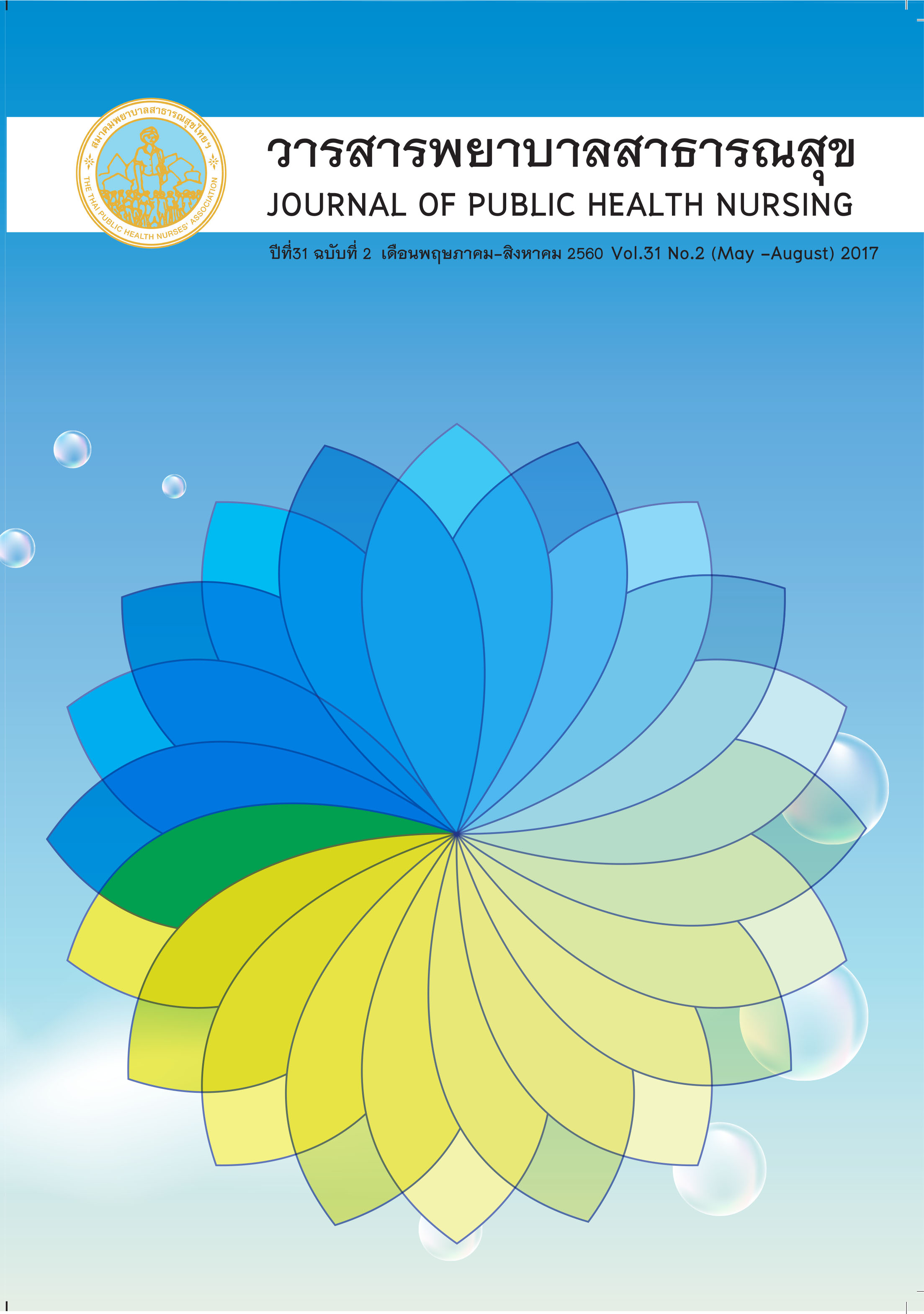การรับรู้ความเสี่ยง ความรู้ระดับปฏิบัติ และการจัดการของภาคีเครือข่ายสุขภาพชุมชนในภาวะน้ำมันรั่วลงทะเล
Keywords:
การรับรู้ความเสี่ยง, การจัดการสุขภาพ, ภาคีเครือข่ายสุขภาพ, น้ำมันรั่วลงทะเล, Risk perception, health management, health care network, oil spill, disasterAbstract
การจัดการภัยพิบัติในภาวะน้ำมันรั่วลงทะเลเป็นหน้าที่ที่ทุกภาคส่วนต้องร่วมมือกันเพื่อลดผลกระทบรุนแรง การศึกษาครั้งนี้มีวัตถุประสงค์เพื่อศึกษาความสัมพันธ์ระหว่างปัจจัยด้านองค์กร ความรู้ระดับปฏิบัติ การรับรู้ความเสี่ยงด้านสุขภาพ กับการจัดการของภาคีเครือข่ายสุขภาพชุมชน และความต้องการพัฒนาศักยภาพเพื่อความเข้มแข็งในการจัดการในภาวะน้ำมันรั่วลงทะเล กลุ่มตัวอย่าง ได้แก่ ภาคีเครือข่ายสุขภาพชุมชนจำนวนทั้งสิ้น 101 คน โดยถูกคัดเลือกโดยวิธีสุ่มตัวอย่างแบบเฉพาะเจาะจง เก็บรวบรวมข้อมูลโดยใช้แบบสัมภาษณ์ การสนทนากลุ่มและการสัมภาษณ์เชิงลึก ตรวจสอบความน่าเชื่อถือของแบบวัดการรับรู้ความเสี่ยง ความรู้ระดับปฏิบัติ และการจัดการของภาคีเครือข่ายต่อสุขภาพในภาวะน้ำมันรั่วลงทะเล มีค่าความเชื่อมั่นอยู่ระหว่าง .69 - .99 วิเคราะห์ข้อมูลเชิงปริมาณด้วยสถิติเชิงพรรณนาและใช้การวิเคราะห์เชิงเนื้อหาสำหรับข้อมูลเชิงคุณภาพ ผลการศึกษาพบว่า ภาคีเครือข่ายสุขภาพชุมชนเป็นสมาชิกองค์กรชุมชน ร้อยละ 84.2 เป็นส่วนราชการร้อยละ 15.8 รับรู้ความเสี่ยงในการสัมผัสสารเคมีในน้ำมันระดับปานกลาง (M = 2.8, S.D. = 0.3) รับรู้ความรุนแรงภัยคุกคามระดับมาก (M = 3.9, S.D. = 0.4) มีความรู้ระดับปฏิบัติในการจัดการภาวะสุขภาพระดับมาก (M = 2.9, S.D. = 0.4) และจัดการภาวะสุขภาพในระดับน้อยร้อยละ 48.5 ภาคีเครือข่ายฯ มีความต้องการพัฒนาศักยภาพเรื่องสารเคมีในน้ำมันดิบ ผลกระทบต่อสุขภาพ วิธีการเก็บกู้ การเฝ้าระวังสุขภาพ การจัดทำแผนภัยพิบัติน้ำมันรั่วและการจัดการข้อมูล ปัจจัยที่มีความสัมพันธ์กับการจัดการสุขภาพของภาคีเครือข่ายฯ ได้แก่ ประเภทภาคีเครือข่ายฯ ( = 8.82, p-value < .05) การจัดสรรทรัพยากร ( = 8.09, p-value < .05) และความรู้ระดับปฏิบัติ (r = .203, p-value < .05) อย่างมีนัยสำคัญทางสถิติที่ระดับ .05 ข้อเสนอแนะจากผลการวิจัย พยาบาลชุมชนควรให้ความรู้ของภาคีเครือข่ายเกี่ยวกับการตอบสนองต่อภาวะน้ำมันรั่ว การร่วมจัดเตรียมทรัพยากรและประสานการมีส่วนร่วมขององค์กรชุมชนในการจัดทำนโยบายและแผนสาธารณภัยของพื้นที่ในการรองรับภัยพิบัติได้อย่างครบวงจร
Risk Perceptions, Practical Knowledge, and Disaster Management : A Community Healthcare Network’s Readiness for an Oil Spill Event
Oil spill disaster management is the duty of government agencies and private organizations responsible for minimizing potential dangers in society. Aims of this study were to highlight the relationship between organization type, practical knowledge, health risk perception and disaster management by community healthcare networks in the event of an oil spill and to bring attention to abilities needing improvement in oil spill management. The population sample was 101 community healthcare workers selected by snowball technique from different community organizations. Subjects were selected by simple random sampling from village health volunteers. Data were collected by interview questionnaire, focus group and in-depth interview using standard guidelines. Quantitative data were expressed as descriptive statistics with content analysis used for qualitative data. Results revealed that 84.2 %of community healthcare network members studied were from community organizations and 15.8 were government officers. Some of them were engaged in healthcare management, in formulating local contingency plans and providing material resources (55.4 %, 20.8 %, and 10.9 %, respectively). Overall perception of the risks of contact with hazardous chemical from crude oil was at a middle level (M = 2.8, S.D. = 0.3) and severity of chemical harm and practical knowledge were at a high level (M = 3.9, S.D. = 0.4 and M = 3.9, S.D. = 0.4, respectively). However, provision of health management was at a low level (48.5 %). Factors significantly related to healthcare management by subjects were type of the network membership (x2 = 8.82, p-value = .003), provision of material resources (x2= 8.09, p-value = .004), and practical knowledge (r = .203, p-value = .042). Training needs included the need to increase oil spill management competence regarding toxic components of crude oil, knowledge of health effects, oil spill response, health surveillance procedures, oil spill contingency plan development and data management. These results may be used to increase practical knowledge for integrated resource preparedness and to influence community risk perception and reduce health impacts. Improvements in these areas could greatly improve local oil spill contingency planning.
Downloads
Published
How to Cite
Issue
Section
License
บทความที่ตีพิมพ์และแผนภูมิรูปภาพถือเป็นลิขสิทธิ์ของวารสารพยาบาลสาธารณสุข (Thai Public Health Nurses Association)







